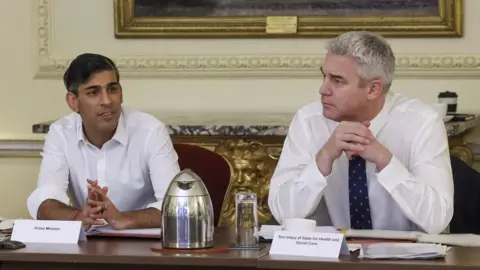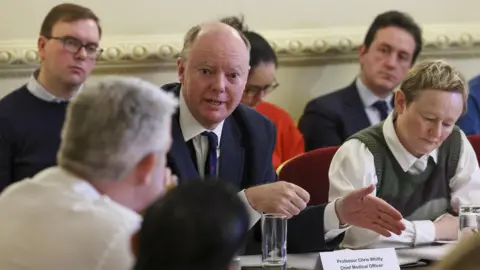PM Sunak welcomes 'valuable' talks with health leaders
 No10 Downing Street
No10 Downing StreetRishi Sunak found a meeting with health leaders to tackle the pressures in the NHS "highly valuable", Downing Street has said.
The prime minister, health secretary and Treasury ministers met health experts from across England on Saturday to discuss "crucial challenges".
Reports have emerged of patients spending days on trolleys because of shortages of beds in some hospitals.
Labour's Keir Starmer urged the PM to "give Britain its NHS back".
On Saturday, Mr Sunak told health and social care leaders he recognised the "tough time" they had experienced over the last couple of years.
The PM also praised the "boldness and radicalism" employed by medical professionals during the pandemic, adding that "we need that same bold and radical approach now because a business-as-usual mindset won't fix the challenges we face".
Mr Sunak said hearing examples of parts of the health service where "things are going well" gave him "enormous confidence", and added that "together today, we can figure out the things that will make the biggest difference to the country and everyone's family, in the short and medium term".
Following the Downing Street talks, a government spokeswoman said the prime minister and his health ministers had "found today's discussions highly valuable for sharing ideas and best practices that could be spread nationwide to improve care for patients throughout the country".
However, Labour's leader Keir Starmer criticised the government's approach, saying that people who face long waits for doctor's appointments, test results or ambulances need "urgent action" and criticised "sticking plaster politics".
Mr Starmer urged the PM to use Labour's plan to slash waiting times by temporarily ramping up partnerships with private providers - a measure which he said would provide "vital", though short, reprieve.
He also argued that a Labour government could provide a longer-term fix and "give Britain its NHS back, through a decade-long programme of renewal and reform, to make the health service fit for the future".
Representatives from the public and private sectors attended Saturday's forum, alongside chief executives and clinical leaders of NHS organisations, local areas and councils from across the country, plus medical and social care experts.
Amanda Pritchard, chief executive of NHS England, and Sir Chris Whitty, chief medical officer for England, also took part in the meeting.
A government spokeswoman reiterated that Mr Sunak had made it one of his top five priorities to reduce NHS waiting lists and said that "the government is investing a record amount in the health service, including in recruiting a record number of doctors and nurses".
She added: "Next steps will be set out in due course."
Senior doctors have said the NHS is on a knife-edge, with long waits for emergency care, routine operations, GP appointments and care for patients when they are discharged from hospital.
High levels of flu and Covid, a wave of strike action and a cost-of-living crisis are also putting huge pressure on the health service.
 Number Ten
Number TenThe government in England has already announced plans to roll out virtual ward beds so that more people can be treated at home, a new service to save thousands of ambulance call-outs to people who have fallen, and more funding to improve emergency care and adult social care.
More than 90 diagnostic hubs, housed in venues such as football stadiums and shopping centres, have also been opened to reduce the queues for tests, checks and scans.
The hubs enable GPs to refer patients for procedures like MRI and CT scans without the need for a hospital visit.
The government says it wants 40% of all diagnostic activity to take place in the hubs by 2025. It also aims to eliminate 18-month waits by April 2023 and 12-month waits by March 2025.
Although two-year waits for routine treatment have shrunk since the pandemic, experts say there is still a mountain to climb before the numbers of patients waiting longer than a year start coming down.
More than seven million people are currently on a hospital waiting list for a non-urgent operation or treatment in England - one in eight of the population.
On Monday, health unions have been invited to meet Health Secretary Steve Barclay to discuss pay for 2023-24 from April - but union leaders say the government must act on the current pay dispute for this year, and the talks will not stop planned strikes in January.
Speaking to the BBC's Today programme on Saturday, Royal College of Nursing General Secretary Pat Cullen said the pay increase nurses would receive in 2022-23 was "fundamental" to the ongoing dispute.
"We'll of course go to the meeting... but it's sadly not what's going to prevent strike action that's planned for 10 days' time," she said.
